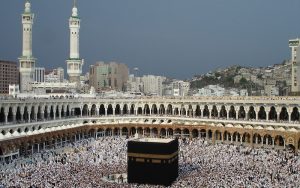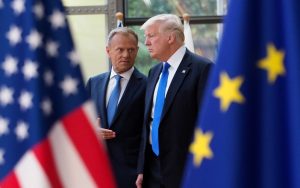The recent incident of the beheading of a teacher in France, as a reaction to the images of the Prophet shown by a history teacher, that had first been published by the satirical magazine Charlie Hebdo (Pailliez, 2020), and the racist attack on two Muslim women at the Eiffel Tower in quick succession have further exposed the fault lines vis-á-vis the debate on secularism. The discussion around secularism continues to be a point of contention across the globe for decades now, and it seems far from settled.
Three Erroneous Linkages
Against this backdrop, the questions around the configuration of the relationship between religion and the state assume a momentum of another kind. However, three commonly erroneous links that characterize the discussion around the relationship of religion and politics in democracies can be sensed in the present moment too. One has to do with the misplaced linkage drawn between liberalism and secularism, while branding everything that is wrong with secularism under the “liberal”-tag without stopping to care for explaining what the term actually implies. So much so, that secularism is being characterized as an attribute of liberalism, which is logically incorrect. Secondly, secularism is understood as one of the pillars and as another pivotal characteristic of democracy, which again shows the extent to which the idea of secularism is central to one’s understanding of democracy. But it nonetheless is a wrongly placed linkage and we may have functioning democracies that exist independent of secularism. Third, is the very concept of secularism and its relationship with religion. More often than not, secularism is understood as keeping the religion out of the public sphere, thus calling for greater privatization of religion. Again, this is only one way of understanding secularism. Strictly speaking, this has never been the dominant strand within political theory and practice, when one studies how various states operationalize the concept of secularism.
Now, before proceeding further, it is important to mention, that so far, the three erroneous links that have been listed, should not deny the limitations in the concept of secularism or a crisis brooding within democracies due to secular exhaustion. This, therefore, should be seen as an attempt to simplify certain misconceptions around the idea of secularism, so that one can understand the contemporary situation better and to attain clarity around the linkages that we tend to draw, often carelessly. We often employ the three words: ‘democracy’, ‘liberalism’ and ‘secularism’ in the same breath, which might at times unnecessarily and unfairly burden one term with the conceptual weight of the other.
Separation is not Elimination
Democracies can function without secularism, definitionally speaking. The absence of secularism does not imply the collapse of democracy or the absence of it. However, if one seeks to historically trace the concept of secularism, one cannot help but think of the Enlightenment rationality that places its hope in the Secular Reason – which was thought to be an ideology of order, that would replace religion as the central force in organizing society and much later evolved as secularism that would enable the state to handle and respond to diverse religious claims and yet abstain from privileging one religion over the other. Conventionally speaking, while one would recall the idea of separation of church and state, as propounded by theorists like John Locke, associated with liberalism, the question arises, did he ever imply chucking out religion from the public sphere? Contextually, he was well aware of the force of religion in the life of an individual and the state and therefore, textually, while he did endorse a separation of the spheres of jurisdiction between church and state, he never implied elimination of religion from the public sphere. Hence, the corporatisation of religion, even within liberalism is a much later development and has often been contested even internally. Thus, even liberals would differ on the terms of the relationship between religion and the state. Therefore, one must abstain from referring to liberal as a monolith tag. Also, separation of church and state is only one of the ways in which one could see the articulation of secularism. The term itself came into being in the 1800s, after almost a gap of over a century between Locke’s death and the birth of this term. Further, it is possible for the state to exist relatively autonomous from the religion and that can well work in tandem without eliminating religion from the public sphere. After all, plainly speaking, what is secularism but the idea that the state or the political authority shall exist in such a way that it does not have to depend on, nor derive its legitimacy from the religious authority. For this to be made possible, one does not require the absence of religion at all from the public sphere, nor the invisibilisation of the same.
Secularism and the Question of Religious Identity
At the same time, it should be mentioned, that whatever backlash the concept of secularism is facing or whatever exhaustion it is that one can think of vis-á-vis secularism, emanates from two broad issues. One, the tradition of toleration within which one reads secularism. And second, religion in terms of not just beliefs and practices, but in terms of identity and the claims emanating from the same. Hence, the crisis of secularism is not a reaction against the excess of certain religious identities but the refusal to accommodate or acknowledge a set of other religious identities within the political discourse on part of the state and the social hostility towards it. In simple words, the problem is not why a state is, for example, funding a church or a temple, but rather why is the same measure being denied to say a mosque, for that matter.
Further, while secularism can be practised in diverse modes, to simply do away with it by attributing it to the West entirely is again an ill-founded argument. For it is true that secularism arose in the West due to the demands thrown up by the political conditions of the time. However, referring to it as a Western idea not only obliterates the contestations and diverse debates around secularism within the West itself, but also reduces the internal diversity intrinsic to the practice of secularism as seen from one country to another, to a homogenous practice redacted of its diverse historical and cultural contexts. As a simple example, secularism in the US would be different than, say, in France or the UK or Germany.
Finally, as long as religion remains a lived reality that guides our ways of being and living, and as long as we require some kind of political authority to manage the affairs for us, the question of secularism cannot be really done away with, irrespective of the ideology or the paradigm, be it liberal or non-liberal. Hence, secularism and religion are not two distinct domains or world-views that can be understood independent of each other, or even experienced in an exclusive way or at war with one another. At the root of it all is a misplaced dichotomy. The very idea that these two are distinct spheres is thus inherently problematic, wherein there is a misplaced sense that one could, say, blame religion without holding secularism to account or vice versa for the problems that confront the world in the present moment.
The Sacred Union of Liberal Democracy and Secularism?
Yes, there are certainly difficulties that come along with the idea of secularism. And yes, certain sets of interpretive exegesis have let certain sections of the population down. Yes, more needs to be done and the traditional framework of toleration and modern notion of state neutrality is not helping, as multicultural challenges overwhelm the core of secularism and therefore many revisions will be required on urgent basis. However, it also cannot be denied that as long as religious diversity bedecks our social fabric and the need to ensure that the religious authority does not infringe upon the political authority, or the political authority does not have to depend on the religious authority for legitimacy, the idea of secularism will remain with us, if not wholly, then at least in various residual forms. Therefore, one should abstain from carelessly branding the kinds that render secularism the monopoly of any one political tradition or ideology, since it must be remembered that secularism in function clearly predates the rise of liberal democracies.
Cultural Racism and Multicultural Challenges
One final word on the existing framework employed to understand secularism: while the debates around secularism are strongly rooted within the tradition of toleration, one must at the same time remember that it is this tradition which also sets the limits on the scope of secularism. For instance, when it comes to religious toleration, the premise inevitably fixes itself around the distinction of religious beliefs and practices and therefore any incident of “intolerance” is countered by questioning the religious beliefs and practices approved of within that religion, in the name of which perpetrator of intolerance acts or commits the hate crimes. This is not helpful, however, and is limiting in many ways.
The tradition of toleration not only makes one oblivious to the domain of religion as identity and the force of religious identity, but, in addition to advoting for the maintainance of strict lines between the public and the private, it also renders the entire debate more around individuals and less the groups and communities. If one then follows the arguments within the tradition of toleration, one will fail to situate the hate crimes committed as a form of racism, or cultural racism to be precise. However, what makes these attacks racist, is that they emanate from a hatred directed against the people of a particular religious identity, and while religious beliefs and practices can and do overlap with religious identity and are often a source of the same, these attacks more often than not are not really a litmus test of how true one is as a Muslim or a Christian vis-á-vis the practices. One’s name or the symbol that marks one’s religious identity is enough to make one the recipient of such hate. Hence forcing one community to take an apologetic stance, invoking the authenticity of approval around their religious beliefs or practices in the midst of such spree of incidents is not a solution, when the problem is not really about the beliefs and practices but beyond it. The tradition of toleration will do little to help us understand and deal with certain chain reactions. Here the question is less about one’s religious beliefs and practices and more about the people marked by religious identity. Say, for example, commenting on such incidents committed out of hate for a particular community, without taking into account the historical context against which a particular identity comes to be racialised will be an error of judgement. It is needless to say that no amount of violence can be justified as a reaction to any article that one finds hurtful or hurts the religious sentiments of a community. And at the same time, a multilogue is essential to understand why certain points are hurtful for a community within the domain of freedom of enquiry (Modood, 2019).
The Charlie Hebdo attacks in 2015 and the later analysis that followed was a stark reminder that behind the incident was a larger narrative about the alienation of the Algerian Muslim community in France and its perception that French secularism was being interpreted in a way that was meant to specifically humiliate and disenfranchise them. Further, the cartoons in the Charlie Hebdo magazine are analogous to the ethnic cartoons of Jews in Nazi Germany or the bespeckled, buck-toothed drawings of Japanese in American World War II posters. These kinds of images demean a whole race or culture. (Juergensmeyer, 2017). For instance, questioning holocaust or the holocaust denial is hurtful and extremely insensitive and is thus punishable in sixteen European countries. On similar lines, there can be certain issues which other communities can be sensitive about and a dialogue to understand this, while institutionalising this process of understanding would do no harm to anyone. If at all, instituting measures of such kind can make the conditions of diverse existence more amiable, while upholding the freedom of enquiry which can be carried out in numerous ways and not every way will necessarily appear hurtful.
Crimes or acts committed out of hate cannot really be seen at the level of individuals alone, as it obfuscates at times genuine grievances and the chain reaction that perpetuated those grievances for a period of time. If a set of thinkers started batting for a separation of church and state in the sixteenth and seventeenth century, it was not in relation to a particular radical individual unleashing violence in the name of religion – it was in relation to a confluence of events rooted in sectarian conflict and a chain of incidents linked to the same. The refusal to acknowledge the same would be of no avail in understanding the gravity of the situation and the pragmatic solution that the tradition of toleration brought for the people in that particular time period. And while we must be mindful of the same, in the present moment the situation has certainly changed, and a lot of other factors have come into play which must be taken into account, in order to find a viable solution, suited to the need and demands of the time.
SourcesJuergensmeyer, M., 2017. The Imagined War between Secularism and Religion. In: P. Zuckerman & J. R. Shook, eds. The Oxford Handbook of Secularism. s.l.:s.n.
Modood, T., 2019. Essays on Secularism and Multiculturalism. s.l.:ECPR press.
Pailliez, C., 2020. Beheading of teacher exposes secular divide in French classrooms. Reuters , 22 October.








Be First to Comment